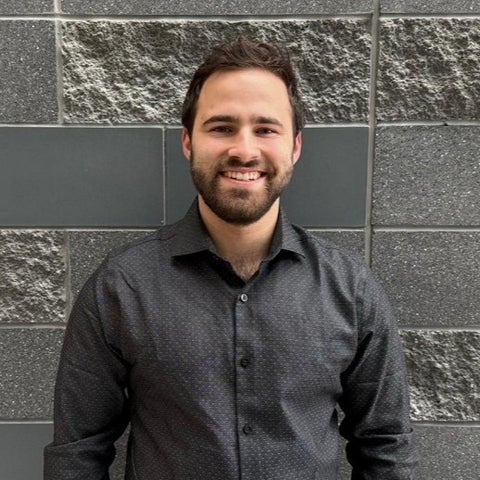Change makers in action: How Waterloo co-op students drive real-world impact
By: Mary Lynne Bartlett (she/her)
At the centre of meaningful transformation is a change maker. This is an individual that turns vision into action and challenges into opportunities.
Moderated by Jessica Lang, associate director of career education at the Centre for Career Development, the Change makers in action panel highlighted how students are not only contributing to their workplaces but also shaping them. Each student delivered a three-minute presentation showcasing their impact and offered practical advice for employers looking to maximize the value of hiring co-op students.
Lang described the definition of a change maker generated by Microsoft Copilot as “someone who actively seeks positive change in their community, organization or the world at large. This person is identified by their ability to identify problems, envision innovative solutions, and take action to implement those solutions. Change makers are often driven by a strong sense of purpose and a desire to make a meaningful impact.”
This definition captures the spirit of the students featured at the 2025 Employer Impact Conference. Four standout University of Waterloo co-op students shared how they made a meaningful impact during their work terms, and how employers can unlock the full potential of student talent.
Uncovering the benefits of co-op students
When you hire a Waterloo co-op student, you gain access to talent that bridges academic knowledge with real-world application.
Here are four key benefits employers can expect, as shared by the student panelists:
1. Enhanced team dynamics
Co-op students bring fresh energy and foster collaboration. Shawn Benedict, a Nanotechnology Engineering student, worked as a programmer and software developer in AI research at SINTEF in Norway. He shared how SINTEF built a strong workplace culture through activities like lunch socials and ski trips.
“…It created more ease for coworkers and supervisors to collaborate. This led to issues being solved much quicker,” Benedict said.
The result was faster learning, stronger communication and a more cohesive team.

Shawn Benedict, Nanotechnology student
2. Increased innovation
Students come in with various experiences and aren’t afraid to ask questions. Daisy Martin, a Psychology student in the Faculty of Arts, implemented a new data management system at United Way Waterloo Region Communities. Her initiative led to smarter use of technology and a complete revamp of the organization’s project management processes.
“Daisy has improved processes and brought new ideas to the table, largely focused on using technology smarter. Her project management skills will have a lasting impact on our organization,” Sharlene Erasmus, Martin’s supervisor said.
Martin’s work left a lasting impact on the organization’s efficiency and culture.

Daisy Martin, Psychology student
3. A competitive advantage
Students’ curiosity and willingness to take risks can drive innovation. Matthew Stebelsky, a Management Engineering student, was hired as a data scientist at Innovation, Science and Economic Development Canada. His supervisor trusted him with building a “data hub” to streamline internal processes.
“My supervisor recognized my technical background, and I was asked to flesh out the concept and drive its implementation,” Stebelsky said.
His work reduced turnaround times and freed up staff capacity—proof that giving students ownership can lead to meaningful results.

Matthew Stebelsky, Management Engineering student
4. Streamlined processes
Co-op students take the initiative and bring solutions. Kennedy Taylor, a Legal Studies student, worked as a business analyst at Coeus Health. During her term, she identified inefficiencies and led improvements, thriving in the fast-paced startup environment.
“Kennedy has surpassed all expectations…she has proven to thrive in the start-up environment, constantly seeking ways to add value and guide us towards our goals and mission,” Madison McBay, Taylor’s supervisor, said.
Taylor’s proactive mindset and problem-solving skills helped position the company for growth.

Kennedy Taylor, Legal Studies student
Creating environments where change makers thrive
Beyond hiring, students shared what helps them succeed—and what employers can do to support them.
Foster trust
Students thrive when they’re trusted to explore and innovate. Trust builds confidence and encourages students to take initiative.
Provide support, no one will be too harsh on you. Be open to the students needing more clarity as time goes on.
Build rapport
Strong relationships with supervisors and coworkers help students feel comfortable and engaged. Simple actions like shared lunches or informal chats can go a long way.
Make sure the students are comfortable with supervisors and other coworkers. There is so much you can learn from everyone at the company.
Encourage questions
Create an open-minded environment where questions are welcomed fosters learning and innovation.
It starts with the environment. The employee needs to feel welcomed to share perspectives. It matters to listen to what they have to say, regardless of the task.
Set clear expectations
Clarity helps students understand their goals and exceed them.
Start with expectations, then ask what they are interested in, what skills do they want to learn and allow students to pitch ideas. This helps students look to make change.
Creating a supportive and engaging environment for co-op students not only enhances their learning experience but also strengthens the workplace. By fostering trust, building rapport, encouraging questions and setting clear expectations, employers can empower students to contribute meaningfully and grow with confidence. These students are not just prepared for the workforce; they are ready to lead and innovate.